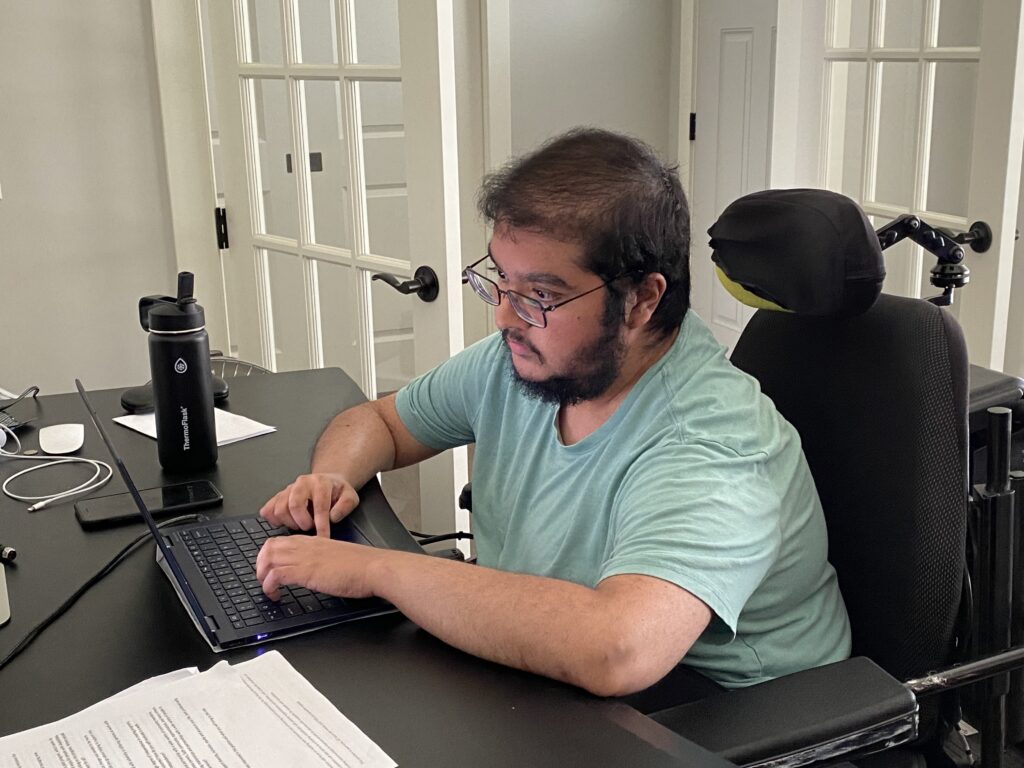 My name is Sumukha Terakanambi, and I am a Policy Consultant with the Minnesota Council on Disability. For the last few years, my goal has been to gain full-time employment as a disability and healthcare policy advocate. In addition to giving me opportunities to pursue what I am interested in, I view employment as a path to achieving more independence, participating in the community, and building financial security. As a person with a disability, I have the desire and ability to work like anyone else. Unfortunately, I – and so many others with disabilities – still face negative stereotypes and systemic barriers when searching for employment.
My name is Sumukha Terakanambi, and I am a Policy Consultant with the Minnesota Council on Disability. For the last few years, my goal has been to gain full-time employment as a disability and healthcare policy advocate. In addition to giving me opportunities to pursue what I am interested in, I view employment as a path to achieving more independence, participating in the community, and building financial security. As a person with a disability, I have the desire and ability to work like anyone else. Unfortunately, I – and so many others with disabilities – still face negative stereotypes and systemic barriers when searching for employment.
This is the third in a series of seven blog posts exploring the major barriers to employment for people with disabilities across the state.
- An Overview
- A Lack of Information about Supports
- Stereotypes and Denying Accommodations
- A Lack of Accessible Transportation
- Support Programs that Discourage Work
- A Lack of Legal Supports
- Conclusions
Background
While society has made significant strides toward greater disability inclusion, negative views of disability persist. Whether it is the belief that people with disabilities cannot be productive or that reasonable accommodations are too costly, people with disabilities often experience an unwelcoming work environment. This blog post explores how the denial of reasonable accommodations – often based on negative stereotypes – affects people with disabilities who have the desire to work and contribute to their communities.
Negative Stereotypes
Blong Moua, a self-advocate and participant in Partners in Policymaking, told me that his day program had difficulties placing him in a job. When I asked him why that happened, he suspected businesses were reluctant to hire people with disabilities. Similarly, Dupree Edwards, a self-advocate, teaching artist, rapper, and community programs specialist at the Institute on Community Integration, said people doubted his ability to maintain long-term employment. Both stories represent one of the most common stereotypes among employers: the belief that people with disabilities cannot be productive. “There is a lot of inherent bias about the worth of people with disabilities,” said Michelle Severson, the Access Consultant at the Minnesota Council on Disability. “Our worth is defined by what we are able to produce. If the perception is that we are not able to produce, then you don’t get hired.”
Reasonable Accommodations
Employers also believe that providing reasonable accommodations is too burdensome. They fail to understand that reasonable accommodations cost very little and enable people with disabilities to get jobs. “There is just so little understanding of what a disability accommodation is when really it is the most basic form of being a supervisor,” said David Fenley, the ADA Director at the Minnesota Council on Disability. “The role of a boss is to give their employees the tools and resources they need to do their job.”
Unfortunately, because of these assumptions, people with disabilities still have to fight to secure reasonable accommodations. Sophie Iverson is an options counselor at the Disability Hub and a self-advocate. One of her previous employers was reluctant to provide even simple accommodations like breaks, getting to sit down, and options to work from home. The employer questioned Sophie’s dedication and work ethic. Ultimately, Sophie ended up leaving the position.
Brittanie Hernandez Wilson, the Equity and Justice Director at Arc Minnesota, also recounted a time she had to advocate for accommodations. She often struggled to leave the employee parking garage because most levels did not have automatic door buttons. Resolving the issue took a long time because the person in charge of accommodations was unresponsive, and the employer had concerns about the cost.
Possible Solutions
Advocates have pushed for policies to counter these harmful stereotypes and ensure employers understand their responsibility to provide accommodations. Some suggestions include:
- Creating a grants program for disability rights organizations to carry out disability inclusion initiatives. These initiatives will educate employers about the benefits of hiring people with disabilities and will increase the number of people with disabilities who are employed.
- Working to empower people with disabilities to be strong self-advocates. Partners in Policymaking, for example, is a leadership and advocacy training program for people with disabilities and parents of children with disabilities.
- Ensuring employers understand their responsibility to provide reasonable accommodations under the Americans with Disabilities Act. Better knowledge among HR professionals and supervisors about accommodations would create more support for employees with disabilities. Resources such as the Employer Reasonable Accommodation Fund reimburse employers for the costs associated with accommodations.
Conclusion
No one with a disability should have to experience discrimination in the workplace. People with disabilities must enjoy the same opportunities to take part in the community and maintain long-term employment as any other person. Advocates and lawmakers must continue taking steps to counter negative stereotypes and increase employment opportunities for people with disabilities.